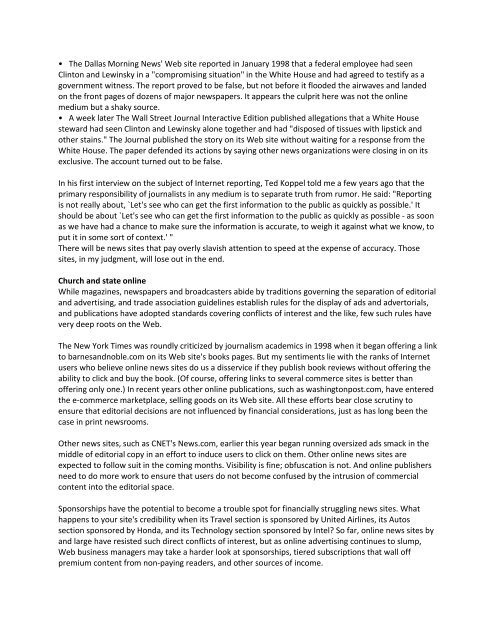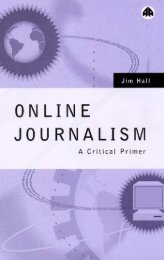Modul Mata Kuliah Journalisme Online - Ayo Menulis FISIP UAJY
Modul Mata Kuliah Journalisme Online - Ayo Menulis FISIP UAJY
Modul Mata Kuliah Journalisme Online - Ayo Menulis FISIP UAJY
You also want an ePaper? Increase the reach of your titles
YUMPU automatically turns print PDFs into web optimized ePapers that Google loves.
• The Dallas Morning News' Web site reported in January 1998 that a federal employee had seen<br />
Clinton and Lewinsky in a "compromising situation" in the White House and had agreed to testify as a<br />
government witness. The report proved to be false, but not before it flooded the airwaves and landed<br />
on the front pages of dozens of major newspapers. It appears the culprit here was not the online<br />
medium but a shaky source.<br />
• A week later The Wall Street Journal Interactive Edition published allegations that a White House<br />
steward had seen Clinton and Lewinsky alone together and had "disposed of tissues with lipstick and<br />
other stains." The Journal published the story on its Web site without waiting for a response from the<br />
White House. The paper defended its actions by saying other news organizations were closing in on its<br />
exclusive. The account turned out to be false.<br />
In his first interview on the subject of Internet reporting, Ted Koppel told me a few years ago that the<br />
primary responsibility of journalists in any medium is to separate truth from rumor. He said: "Reporting<br />
is not really about, `Let's see who can get the first information to the public as quickly as possible.' It<br />
should be about `Let's see who can get the first information to the public as quickly as possible - as soon<br />
as we have had a chance to make sure the information is accurate, to weigh it against what we know, to<br />
put it in some sort of context.' "<br />
There will be news sites that pay overly slavish attention to speed at the expense of accuracy. Those<br />
sites, in my judgment, will lose out in the end.<br />
Church and state online<br />
While magazines, newspapers and broadcasters abide by traditions governing the separation of editorial<br />
and advertising, and trade association guidelines establish rules for the display of ads and advertorials,<br />
and publications have adopted standards covering conflicts of interest and the like, few such rules have<br />
very deep roots on the Web.<br />
The New York Times was roundly criticized by journalism academics in 1998 when it began offering a link<br />
to barnesandnoble.com on its Web site's books pages. But my sentiments lie with the ranks of Internet<br />
users who believe online news sites do us a disservice if they publish book reviews without offering the<br />
ability to click and buy the book. (Of course, offering links to several commerce sites is better than<br />
offering only one.) In recent years other online publications, such as washingtonpost.com, have entered<br />
the e-commerce marketplace, selling goods on its Web site. All these efforts bear close scrutiny to<br />
ensure that editorial decisions are not influenced by financial considerations, just as has long been the<br />
case in print newsrooms.<br />
Other news sites, such as CNET's News.com, earlier this year began running oversized ads smack in the<br />
middle of editorial copy in an effort to induce users to click on them. Other online news sites are<br />
expected to follow suit in the coming months. Visibility is fine; obfuscation is not. And online publishers<br />
need to do more work to ensure that users do not become confused by the intrusion of commercial<br />
content into the editorial space.<br />
Sponsorships have the potential to become a trouble spot for financially struggling news sites. What<br />
happens to your site's credibility when its Travel section is sponsored by United Airlines, its Autos<br />
section sponsored by Honda, and its Technology section sponsored by Intel? So far, online news sites by<br />
and large have resisted such direct conflicts of interest, but as online advertising continues to slump,<br />
Web business managers may take a harder look at sponsorships, tiered subscriptions that wall off<br />
premium content from non-paying readers, and other sources of income.
















